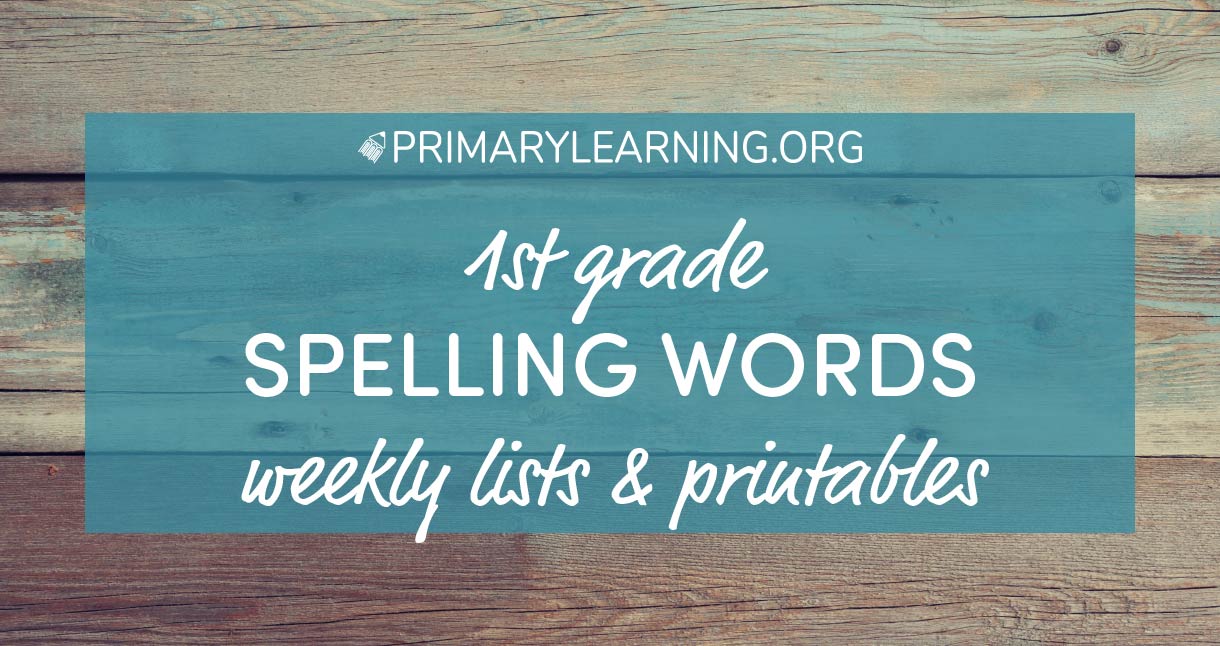

Posted by: Alesia Netuk
Updated: September 28th, 2023
First Grade Spelling Words
First Grade Spelling Words
Children in the first grade are beginning to develop a larger bank of words they can spell independently. While still reliant on spelling many words phonetically, they are acquiring more knowledge of sight words as well as spelling rules and word families. Their growing confidence with letter sounds also supports their spelling skills.
Sight Words
First-grade children need practice working with sight words, which are also known as high-frequency words. These are words that appear most frequently in texts, such as “could,” “them,” and “just.” First-grade children can also begin learning larger high-frequency words, such as “after,” “give,” and “thank.”
Educators may choose to introduce a few high-frequency words each week. Children can be immersed in reading books that contain these words. They can also participate in shared, modeled, and independent writing activities that allow them to practice their weekly words. For example, the educator may include the high-frequency words in a morning message that is read together. Or, children can be provided with sentence starters that allow them to practice their words.
Consider adding high-frequency words to a word wall. Having the words on display allows children to refer to them, supporting their independence with writing. Word walls can be displayed on a bulletin board, or children can have their own personal word walls to look at.
Learning Letter-Sounds
First-grade children will continue solidifying their knowledge of the sounds letters make. Knowing their sounds will assist them greatly with their spelling skills. They can learn to stretch out their words, recording each sound they hear.
When teaching children how to say words slowly so they can hear each sound and follow a pattern. These words tend to have three very distinct sounds that children can hear more easily. Start with words such as “ball,” “wall,” and “hall.” The use of Elkonin boxes, also referred to as sound boxes, can support children’s learning of three-letter words.
Spelling Rules and Word Families
Introducing first-grade children to spelling rules and word families will help them increase the number of words they can spell. For example, learning long vowel sounds can be paired with lessons about the role of the silent “e.” Children can see how a word like “mat” becomes “mate” with the addition of the “e.”
Print-Rich Environment
Creating a print-rich environment will support children’s developing spelling skills. Surround children with different types of print including books, anchor charts, word wall, poems and rhymes, and labeled objects. It is also beneficial to provide children with opportunities to work with tools such as magnetic letters, letter tiles, and letter stamps. Playing board games and card games that focus on language can also help children with their emerging writing skills.
First Grade Spelling Words List
Words for first graders to be able to read, write, and spell by the end of 1st grade.
week 1: the, are, was, but, back, hack, lack, pack, rack.
week 2: like, said, come, play, ball, call, fall, mall, wall.
week 3: here, with, went, they, ramp, lamp, camp, damp, champ.
week 4: help, away, look, this, beck, deck, heck, neck, peck.
week 5: have, make, away, help, bell, yell, cell, well, fell.
week 6: there, little, down, want, best, nest, rest, test, vest.
week 7: will, jump, find, must, kick, tick, lick, pick, sick.
week 8: what, ride, into, saw, bill, dill, hill, mill, pill.
week 9: an, by, too, had, king, ring, sing, wing, ping.
week 10: him, her, let, of, mock, dock, rock, sock, lock.
week 11: as, his, new, then, buck, puck, yuck, duck, luck.
week 12: when, ask, how, put, bunk, dunk, funk, hunk, junk.
week 13: has, may, ran, them, bump, jump, lump, dump, pump.
week 14: any, just, bail, tail, sail, mail, nail.
week 15: fly, stop, gain, main, pain, rain, vain.
week 16: from, came, bent, sent, cent, dent, tent.
week 17: some, run, beep, deep, jeep, keep, peep.
week 18: see, going, weed, deed, seed, feed, reed.
week 19: two, three, week, leek, meek, peek, seek.
week 20: old, brown, beat, meat, neat, peat, seat.
week 21: soon, four, oat, boat, goat, coat, moat.
week 22: pretty, after, bake, cake, fake, lake, rake.
week 23: eat, were, name, came, same, fame, game.
week 24: live, please, face, lace, mace, pace, race.
week 25: good, well, late, mate, date, fate, gate.
week 26: under, ride, mane, cane, pane, lane, bane.
week 27: black, white, gale, tale, male, pale, sale.
week 28: over, take, page, cage, rage, sage, wage.
week 29: open, know, dice, lice, mice, nice, rice.
week 30: give, every, hide, ride, side, tide, wide.
week 31: think, again, bile, file, mile, pile, tile.
week 32: walk, thank, dine, fine, line, tine, pine.
week 33: could, once, nose, pose, rose, hose, close.
week 34: round, yellow, note, rote, vote, tote, dote.
week 35: cove, dove, love, glove, dome, home, gnome.
week 36: dune, rune, tune, mule, rule, cube, tube.
First Grade Spelling Worksheets
LEARNING MATERIALS TO MEET EVERY CHILD’S NEEDS
Here, at PrimaryLearning.Org, we tend to deliver the best-differentiated learning materials to K-2 students. Our resources can be easily incorporated into multisensory lessons to meet every child’s needs, whether s/he is a visual, kinesthetic, or auditory learner.